Business Law Report: Business Law, Regulations, and Remedies
VerifiedAdded on 2022/12/15
|14
|4086
|440
Report
AI Summary
This report delves into various aspects of UK business law, beginning with an introduction to the importance of legal frameworks in business. It explores the formation of different company types, specifically focusing on the advantages of a Public Limited Company (PLC) for the Puri brothers, along with the duties of company directors. The report then examines employment law, including employer and employee responsibilities, redundancy, and wrongful dismissal, followed by an analysis of health and safety regulations, referencing the Health and Safety at Work Act 1974 and the Management of Health and Safety at Work Regulations 1999. It also covers data protection regulations, discussing the UK Data Protection Act 2018 and its relation to GDPR. Furthermore, the report outlines remedies available in contract law, using examples, and concludes with a case scenario involving offer and acceptance in a supermarket context, referencing the Pharmaceutical Society of Great Britain v Boots [1953] case.
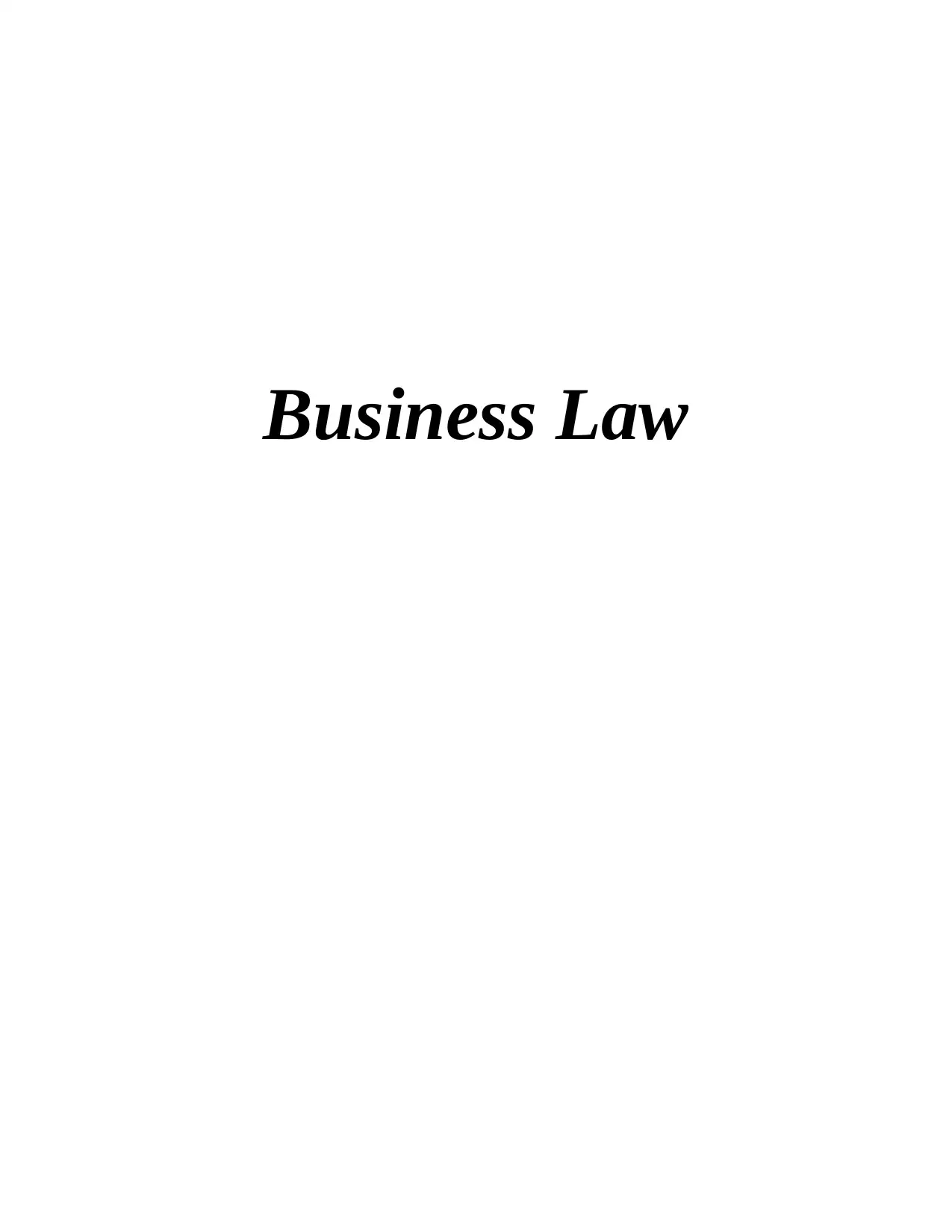
Business Law
Paraphrase This Document
Need a fresh take? Get an instant paraphrase of this document with our AI Paraphraser
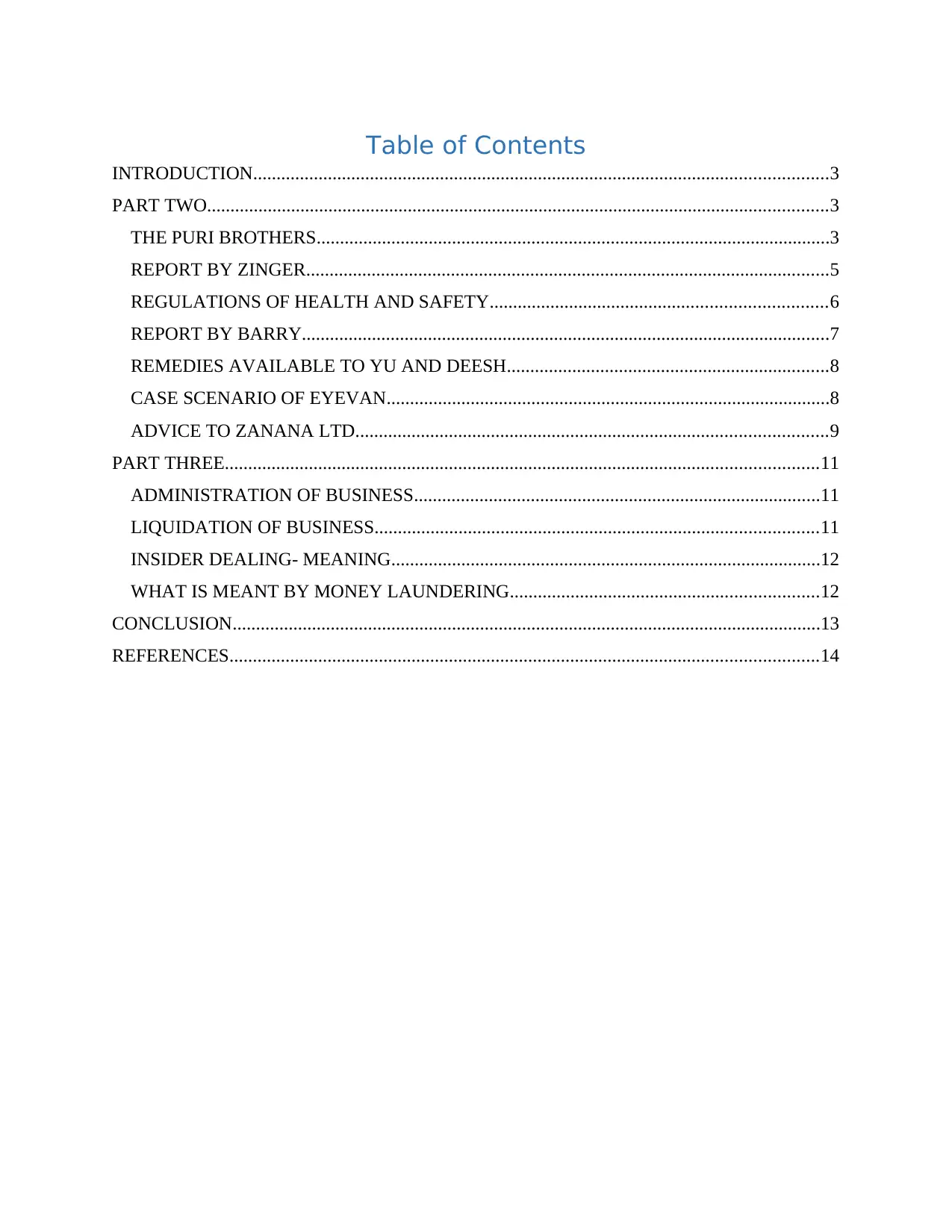
Table of Contents
INTRODUCTION...........................................................................................................................3
PART TWO.....................................................................................................................................3
THE PURI BROTHERS..............................................................................................................3
REPORT BY ZINGER................................................................................................................5
REGULATIONS OF HEALTH AND SAFETY........................................................................6
REPORT BY BARRY.................................................................................................................7
REMEDIES AVAILABLE TO YU AND DEESH.....................................................................8
CASE SCENARIO OF EYEVAN...............................................................................................8
ADVICE TO ZANANA LTD.....................................................................................................9
PART THREE...............................................................................................................................11
ADMINISTRATION OF BUSINESS.......................................................................................11
LIQUIDATION OF BUSINESS...............................................................................................11
INSIDER DEALING- MEANING............................................................................................12
WHAT IS MEANT BY MONEY LAUNDERING..................................................................12
CONCLUSION..............................................................................................................................13
REFERENCES..............................................................................................................................14
INTRODUCTION...........................................................................................................................3
PART TWO.....................................................................................................................................3
THE PURI BROTHERS..............................................................................................................3
REPORT BY ZINGER................................................................................................................5
REGULATIONS OF HEALTH AND SAFETY........................................................................6
REPORT BY BARRY.................................................................................................................7
REMEDIES AVAILABLE TO YU AND DEESH.....................................................................8
CASE SCENARIO OF EYEVAN...............................................................................................8
ADVICE TO ZANANA LTD.....................................................................................................9
PART THREE...............................................................................................................................11
ADMINISTRATION OF BUSINESS.......................................................................................11
LIQUIDATION OF BUSINESS...............................................................................................11
INSIDER DEALING- MEANING............................................................................................12
WHAT IS MEANT BY MONEY LAUNDERING..................................................................12
CONCLUSION..............................................................................................................................13
REFERENCES..............................................................................................................................14
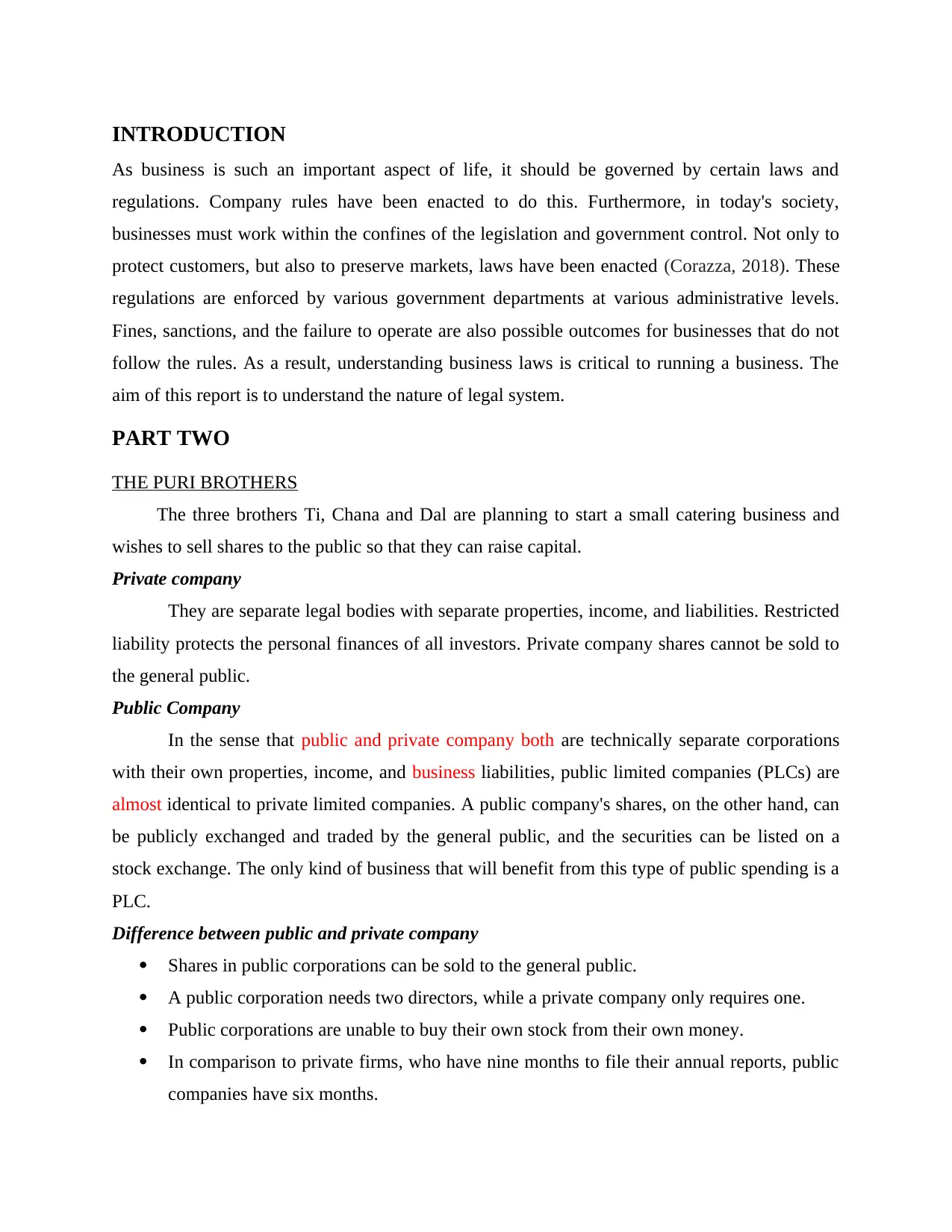
INTRODUCTION
As business is such an important aspect of life, it should be governed by certain laws and
regulations. Company rules have been enacted to do this. Furthermore, in today's society,
businesses must work within the confines of the legislation and government control. Not only to
protect customers, but also to preserve markets, laws have been enacted (Corazza, 2018). These
regulations are enforced by various government departments at various administrative levels.
Fines, sanctions, and the failure to operate are also possible outcomes for businesses that do not
follow the rules. As a result, understanding business laws is critical to running a business. The
aim of this report is to understand the nature of legal system.
PART TWO
THE PURI BROTHERS
The three brothers Ti, Chana and Dal are planning to start a small catering business and
wishes to sell shares to the public so that they can raise capital.
Private company
They are separate legal bodies with separate properties, income, and liabilities. Restricted
liability protects the personal finances of all investors. Private company shares cannot be sold to
the general public.
Public Company
In the sense that public and private company both are technically separate corporations
with their own properties, income, and business liabilities, public limited companies (PLCs) are
almost identical to private limited companies. A public company's shares, on the other hand, can
be publicly exchanged and traded by the general public, and the securities can be listed on a
stock exchange. The only kind of business that will benefit from this type of public spending is a
PLC.
Difference between public and private company
Shares in public corporations can be sold to the general public.
A public corporation needs two directors, while a private company only requires one.
Public corporations are unable to buy their own stock from their own money.
In comparison to private firms, who have nine months to file their annual reports, public
companies have six months.
As business is such an important aspect of life, it should be governed by certain laws and
regulations. Company rules have been enacted to do this. Furthermore, in today's society,
businesses must work within the confines of the legislation and government control. Not only to
protect customers, but also to preserve markets, laws have been enacted (Corazza, 2018). These
regulations are enforced by various government departments at various administrative levels.
Fines, sanctions, and the failure to operate are also possible outcomes for businesses that do not
follow the rules. As a result, understanding business laws is critical to running a business. The
aim of this report is to understand the nature of legal system.
PART TWO
THE PURI BROTHERS
The three brothers Ti, Chana and Dal are planning to start a small catering business and
wishes to sell shares to the public so that they can raise capital.
Private company
They are separate legal bodies with separate properties, income, and liabilities. Restricted
liability protects the personal finances of all investors. Private company shares cannot be sold to
the general public.
Public Company
In the sense that public and private company both are technically separate corporations
with their own properties, income, and business liabilities, public limited companies (PLCs) are
almost identical to private limited companies. A public company's shares, on the other hand, can
be publicly exchanged and traded by the general public, and the securities can be listed on a
stock exchange. The only kind of business that will benefit from this type of public spending is a
PLC.
Difference between public and private company
Shares in public corporations can be sold to the general public.
A public corporation needs two directors, while a private company only requires one.
Public corporations are unable to buy their own stock from their own money.
In comparison to private firms, who have nine months to file their annual reports, public
companies have six months.
⊘ This is a preview!⊘
Do you want full access?
Subscribe today to unlock all pages.

Trusted by 1+ million students worldwide
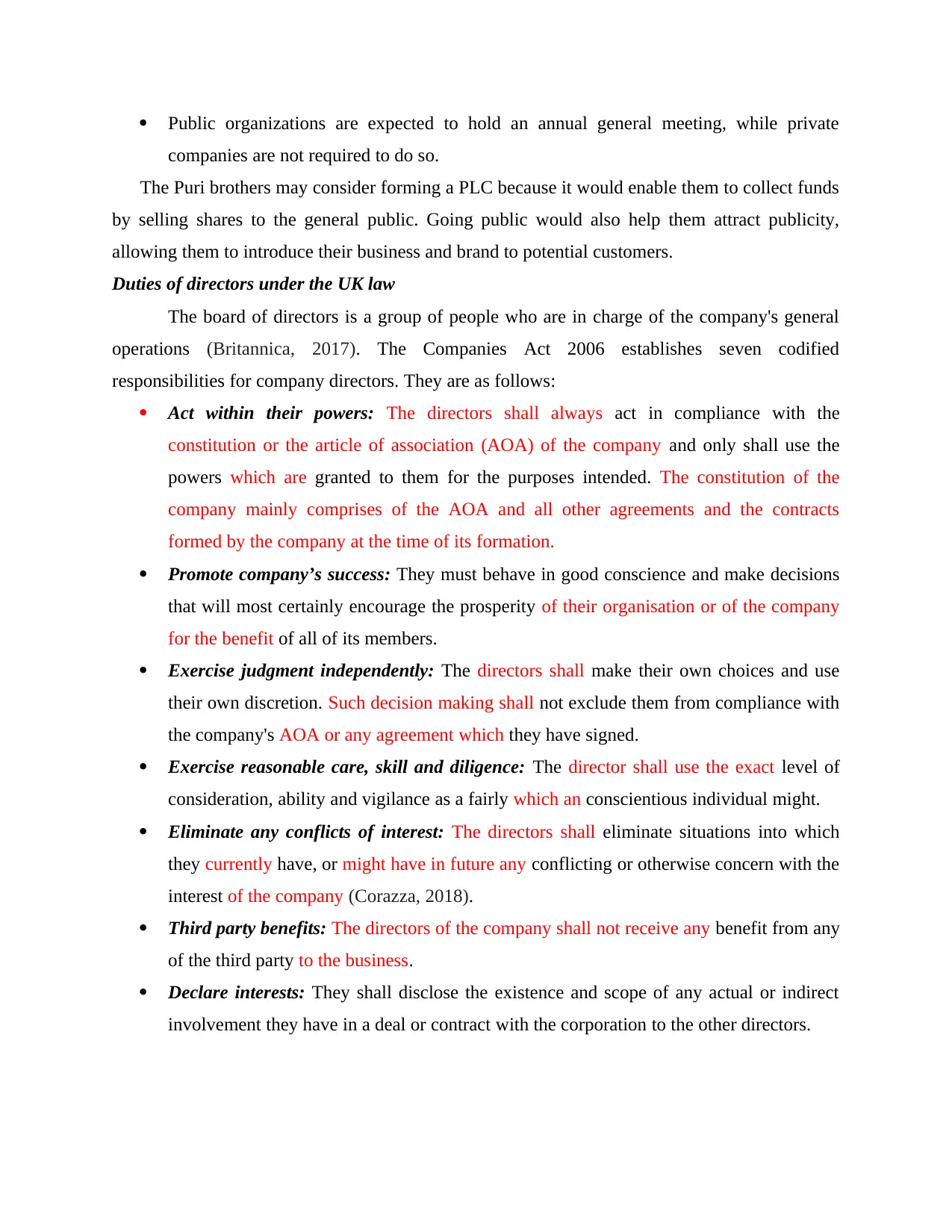
Public organizations are expected to hold an annual general meeting, while private
companies are not required to do so.
The Puri brothers may consider forming a PLC because it would enable them to collect funds
by selling shares to the general public. Going public would also help them attract publicity,
allowing them to introduce their business and brand to potential customers.
Duties of directors under the UK law
The board of directors is a group of people who are in charge of the company's general
operations (Britannica, 2017). The Companies Act 2006 establishes seven codified
responsibilities for company directors. They are as follows:
Act within their powers: The directors shall always act in compliance with the
constitution or the article of association (AOA) of the company and only shall use the
powers which are granted to them for the purposes intended. The constitution of the
company mainly comprises of the AOA and all other agreements and the contracts
formed by the company at the time of its formation.
Promote company’s success: They must behave in good conscience and make decisions
that will most certainly encourage the prosperity of their organisation or of the company
for the benefit of all of its members.
Exercise judgment independently: The directors shall make their own choices and use
their own discretion. Such decision making shall not exclude them from compliance with
the company's AOA or any agreement which they have signed.
Exercise reasonable care, skill and diligence: The director shall use the exact level of
consideration, ability and vigilance as a fairly which an conscientious individual might.
Eliminate any conflicts of interest: The directors shall eliminate situations into which
they currently have, or might have in future any conflicting or otherwise concern with the
interest of the company (Corazza, 2018).
Third party benefits: The directors of the company shall not receive any benefit from any
of the third party to the business.
Declare interests: They shall disclose the existence and scope of any actual or indirect
involvement they have in a deal or contract with the corporation to the other directors.
companies are not required to do so.
The Puri brothers may consider forming a PLC because it would enable them to collect funds
by selling shares to the general public. Going public would also help them attract publicity,
allowing them to introduce their business and brand to potential customers.
Duties of directors under the UK law
The board of directors is a group of people who are in charge of the company's general
operations (Britannica, 2017). The Companies Act 2006 establishes seven codified
responsibilities for company directors. They are as follows:
Act within their powers: The directors shall always act in compliance with the
constitution or the article of association (AOA) of the company and only shall use the
powers which are granted to them for the purposes intended. The constitution of the
company mainly comprises of the AOA and all other agreements and the contracts
formed by the company at the time of its formation.
Promote company’s success: They must behave in good conscience and make decisions
that will most certainly encourage the prosperity of their organisation or of the company
for the benefit of all of its members.
Exercise judgment independently: The directors shall make their own choices and use
their own discretion. Such decision making shall not exclude them from compliance with
the company's AOA or any agreement which they have signed.
Exercise reasonable care, skill and diligence: The director shall use the exact level of
consideration, ability and vigilance as a fairly which an conscientious individual might.
Eliminate any conflicts of interest: The directors shall eliminate situations into which
they currently have, or might have in future any conflicting or otherwise concern with the
interest of the company (Corazza, 2018).
Third party benefits: The directors of the company shall not receive any benefit from any
of the third party to the business.
Declare interests: They shall disclose the existence and scope of any actual or indirect
involvement they have in a deal or contract with the corporation to the other directors.
Paraphrase This Document
Need a fresh take? Get an instant paraphrase of this document with our AI Paraphraser

REPORT BY ZINGER
Businesses do well when their employees are satisfied, and they can both recruit and
maintain the best employees to maximize productivity.
Duties of Employer
There are a variety of requirements derived from UK employment law, and any inability to
follow the required expectations results in a lawsuit and/or claim being filed against the
employer or the company. Among them are the following:
Workplace recruiting activities that are fair.
Job particulars in writing (usually in the form of a contract)
Workplace health and safety provisions and measures
Employer must be paying at least the minimum wage.
Terminating a contract in a fair manner.
Duties of Employees
These can be clarified in the work contract, but the law also states that even though the
contract does not include them, an employee owes those commitments and responsibilities to
their employer (Levitin, 2018). There are some of them:
In any case, do what a reasonable employee would do.
Honesty is a responsibility.
Work with caution and expertise.
It is forbidden to accept bribes.
Redundancy
Redundancy happens when an employee is amde dismissed for the following reasons:
Entirely or mostly because the company has stopped or expects to stop carrying on the
sector under which an employee was working, or in the location where an employee was
employed; or
The reality that the employer's conditions for his employees to complete any specific
work, or for employees to perform a particular work in the area at which an employee
was working, have ceased or diminished, or are likely to cease or diminish.
Businesses do well when their employees are satisfied, and they can both recruit and
maintain the best employees to maximize productivity.
Duties of Employer
There are a variety of requirements derived from UK employment law, and any inability to
follow the required expectations results in a lawsuit and/or claim being filed against the
employer or the company. Among them are the following:
Workplace recruiting activities that are fair.
Job particulars in writing (usually in the form of a contract)
Workplace health and safety provisions and measures
Employer must be paying at least the minimum wage.
Terminating a contract in a fair manner.
Duties of Employees
These can be clarified in the work contract, but the law also states that even though the
contract does not include them, an employee owes those commitments and responsibilities to
their employer (Levitin, 2018). There are some of them:
In any case, do what a reasonable employee would do.
Honesty is a responsibility.
Work with caution and expertise.
It is forbidden to accept bribes.
Redundancy
Redundancy happens when an employee is amde dismissed for the following reasons:
Entirely or mostly because the company has stopped or expects to stop carrying on the
sector under which an employee was working, or in the location where an employee was
employed; or
The reality that the employer's conditions for his employees to complete any specific
work, or for employees to perform a particular work in the area at which an employee
was working, have ceased or diminished, or are likely to cease or diminish.
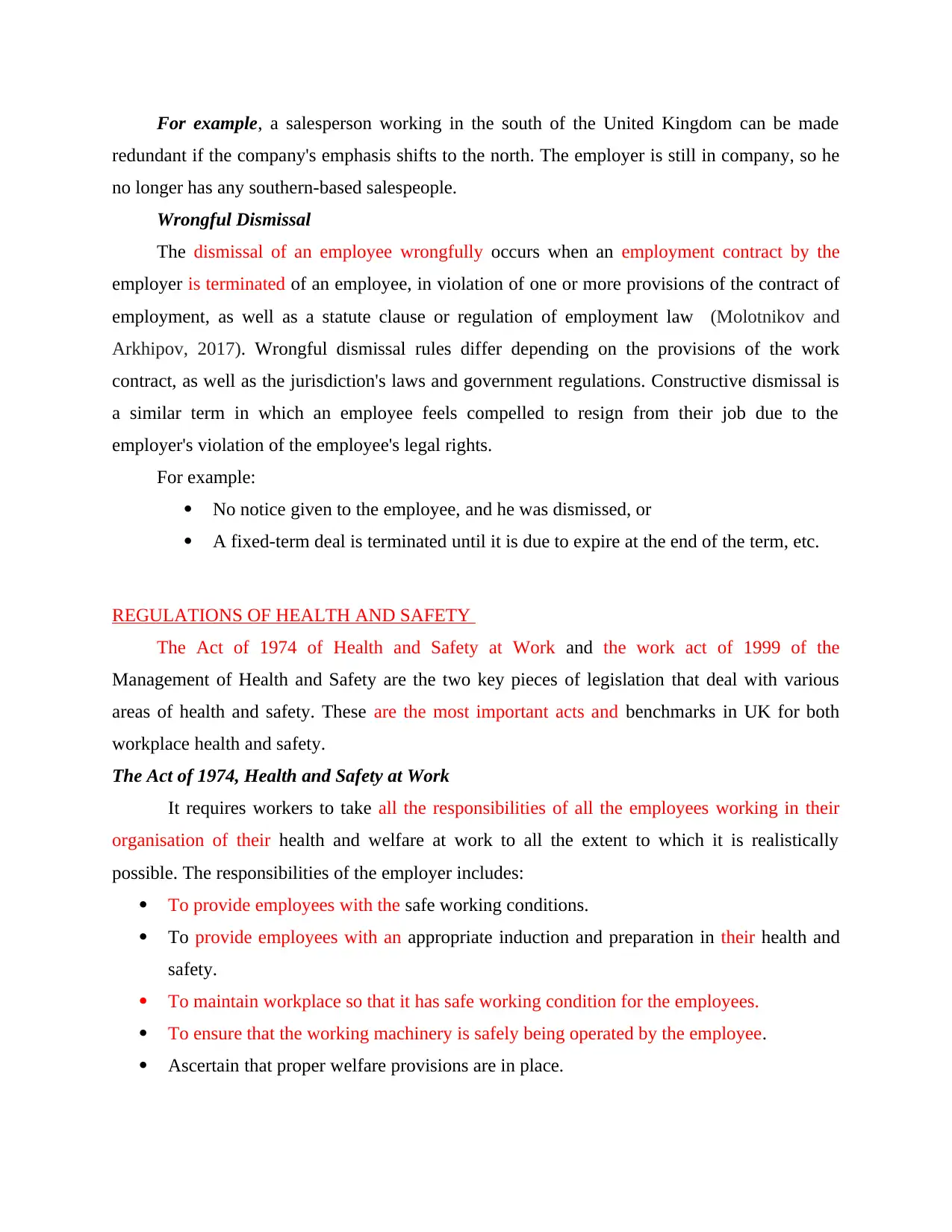
For example, a salesperson working in the south of the United Kingdom can be made
redundant if the company's emphasis shifts to the north. The employer is still in company, so he
no longer has any southern-based salespeople.
Wrongful Dismissal
The dismissal of an employee wrongfully occurs when an employment contract by the
employer is terminated of an employee, in violation of one or more provisions of the contract of
employment, as well as a statute clause or regulation of employment law (Molotnikov and
Arkhipov, 2017). Wrongful dismissal rules differ depending on the provisions of the work
contract, as well as the jurisdiction's laws and government regulations. Constructive dismissal is
a similar term in which an employee feels compelled to resign from their job due to the
employer's violation of the employee's legal rights.
For example:
No notice given to the employee, and he was dismissed, or
A fixed-term deal is terminated until it is due to expire at the end of the term, etc.
REGULATIONS OF HEALTH AND SAFETY
The Act of 1974 of Health and Safety at Work and the work act of 1999 of the
Management of Health and Safety are the two key pieces of legislation that deal with various
areas of health and safety. These are the most important acts and benchmarks in UK for both
workplace health and safety.
The Act of 1974, Health and Safety at Work
It requires workers to take all the responsibilities of all the employees working in their
organisation of their health and welfare at work to all the extent to which it is realistically
possible. The responsibilities of the employer includes:
To provide employees with the safe working conditions.
To provide employees with an appropriate induction and preparation in their health and
safety.
To maintain workplace so that it has safe working condition for the employees.
To ensure that the working machinery is safely being operated by the employee.
Ascertain that proper welfare provisions are in place.
redundant if the company's emphasis shifts to the north. The employer is still in company, so he
no longer has any southern-based salespeople.
Wrongful Dismissal
The dismissal of an employee wrongfully occurs when an employment contract by the
employer is terminated of an employee, in violation of one or more provisions of the contract of
employment, as well as a statute clause or regulation of employment law (Molotnikov and
Arkhipov, 2017). Wrongful dismissal rules differ depending on the provisions of the work
contract, as well as the jurisdiction's laws and government regulations. Constructive dismissal is
a similar term in which an employee feels compelled to resign from their job due to the
employer's violation of the employee's legal rights.
For example:
No notice given to the employee, and he was dismissed, or
A fixed-term deal is terminated until it is due to expire at the end of the term, etc.
REGULATIONS OF HEALTH AND SAFETY
The Act of 1974 of Health and Safety at Work and the work act of 1999 of the
Management of Health and Safety are the two key pieces of legislation that deal with various
areas of health and safety. These are the most important acts and benchmarks in UK for both
workplace health and safety.
The Act of 1974, Health and Safety at Work
It requires workers to take all the responsibilities of all the employees working in their
organisation of their health and welfare at work to all the extent to which it is realistically
possible. The responsibilities of the employer includes:
To provide employees with the safe working conditions.
To provide employees with an appropriate induction and preparation in their health and
safety.
To maintain workplace so that it has safe working condition for the employees.
To ensure that the working machinery is safely being operated by the employee.
Ascertain that proper welfare provisions are in place.
⊘ This is a preview!⊘
Do you want full access?
Subscribe today to unlock all pages.

Trusted by 1+ million students worldwide
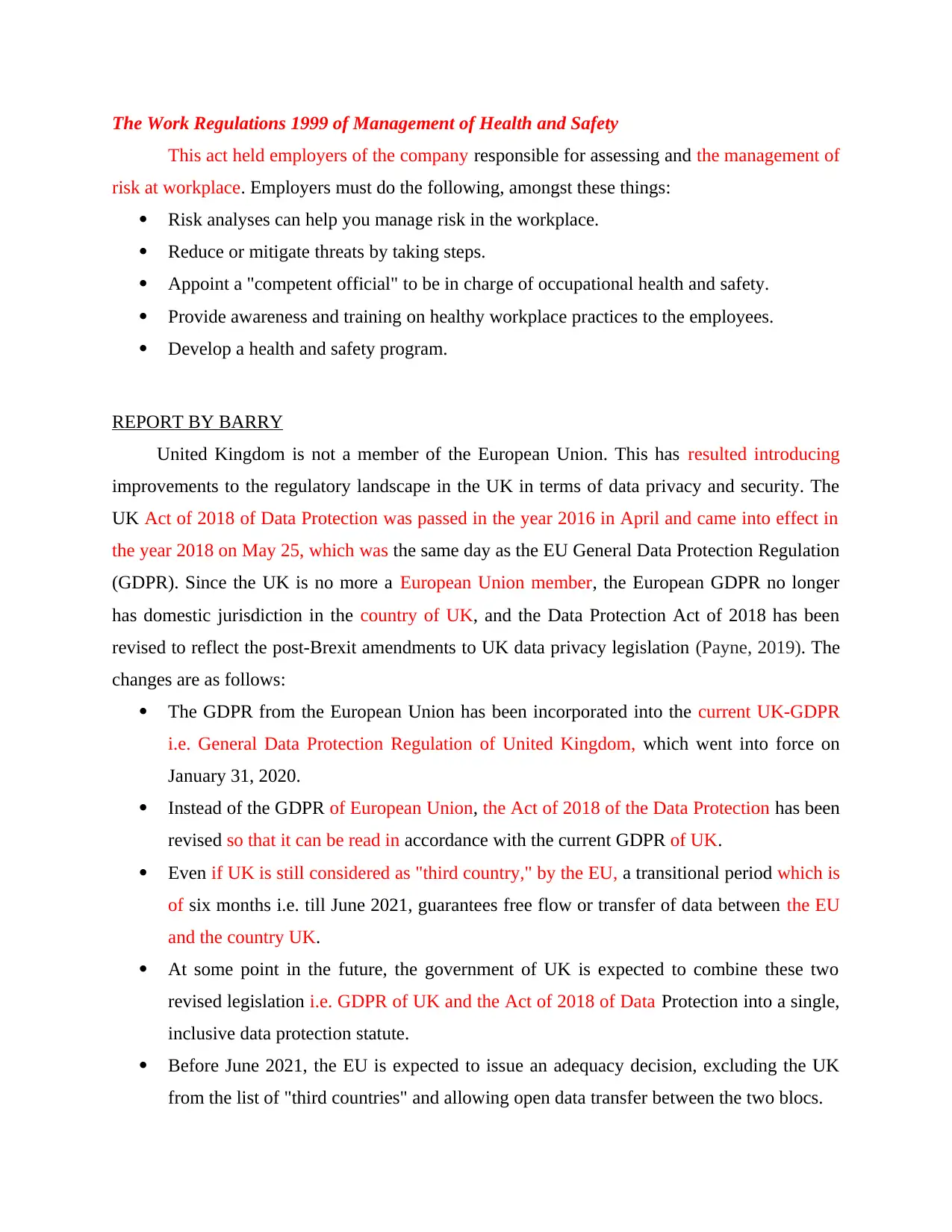
The Work Regulations 1999 of Management of Health and Safety
This act held employers of the company responsible for assessing and the management of
risk at workplace. Employers must do the following, amongst these things:
Risk analyses can help you manage risk in the workplace.
Reduce or mitigate threats by taking steps.
Appoint a "competent official" to be in charge of occupational health and safety.
Provide awareness and training on healthy workplace practices to the employees.
Develop a health and safety program.
REPORT BY BARRY
United Kingdom is not a member of the European Union. This has resulted introducing
improvements to the regulatory landscape in the UK in terms of data privacy and security. The
UK Act of 2018 of Data Protection was passed in the year 2016 in April and came into effect in
the year 2018 on May 25, which was the same day as the EU General Data Protection Regulation
(GDPR). Since the UK is no more a European Union member, the European GDPR no longer
has domestic jurisdiction in the country of UK, and the Data Protection Act of 2018 has been
revised to reflect the post-Brexit amendments to UK data privacy legislation (Payne, 2019). The
changes are as follows:
The GDPR from the European Union has been incorporated into the current UK-GDPR
i.e. General Data Protection Regulation of United Kingdom, which went into force on
January 31, 2020.
Instead of the GDPR of European Union, the Act of 2018 of the Data Protection has been
revised so that it can be read in accordance with the current GDPR of UK.
Even if UK is still considered as "third country," by the EU, a transitional period which is
of six months i.e. till June 2021, guarantees free flow or transfer of data between the EU
and the country UK.
At some point in the future, the government of UK is expected to combine these two
revised legislation i.e. GDPR of UK and the Act of 2018 of Data Protection into a single,
inclusive data protection statute.
Before June 2021, the EU is expected to issue an adequacy decision, excluding the UK
from the list of "third countries" and allowing open data transfer between the two blocs.
This act held employers of the company responsible for assessing and the management of
risk at workplace. Employers must do the following, amongst these things:
Risk analyses can help you manage risk in the workplace.
Reduce or mitigate threats by taking steps.
Appoint a "competent official" to be in charge of occupational health and safety.
Provide awareness and training on healthy workplace practices to the employees.
Develop a health and safety program.
REPORT BY BARRY
United Kingdom is not a member of the European Union. This has resulted introducing
improvements to the regulatory landscape in the UK in terms of data privacy and security. The
UK Act of 2018 of Data Protection was passed in the year 2016 in April and came into effect in
the year 2018 on May 25, which was the same day as the EU General Data Protection Regulation
(GDPR). Since the UK is no more a European Union member, the European GDPR no longer
has domestic jurisdiction in the country of UK, and the Data Protection Act of 2018 has been
revised to reflect the post-Brexit amendments to UK data privacy legislation (Payne, 2019). The
changes are as follows:
The GDPR from the European Union has been incorporated into the current UK-GDPR
i.e. General Data Protection Regulation of United Kingdom, which went into force on
January 31, 2020.
Instead of the GDPR of European Union, the Act of 2018 of the Data Protection has been
revised so that it can be read in accordance with the current GDPR of UK.
Even if UK is still considered as "third country," by the EU, a transitional period which is
of six months i.e. till June 2021, guarantees free flow or transfer of data between the EU
and the country UK.
At some point in the future, the government of UK is expected to combine these two
revised legislation i.e. GDPR of UK and the Act of 2018 of Data Protection into a single,
inclusive data protection statute.
Before June 2021, the EU is expected to issue an adequacy decision, excluding the UK
from the list of "third countries" and allowing open data transfer between the two blocs.
Paraphrase This Document
Need a fresh take? Get an instant paraphrase of this document with our AI Paraphraser
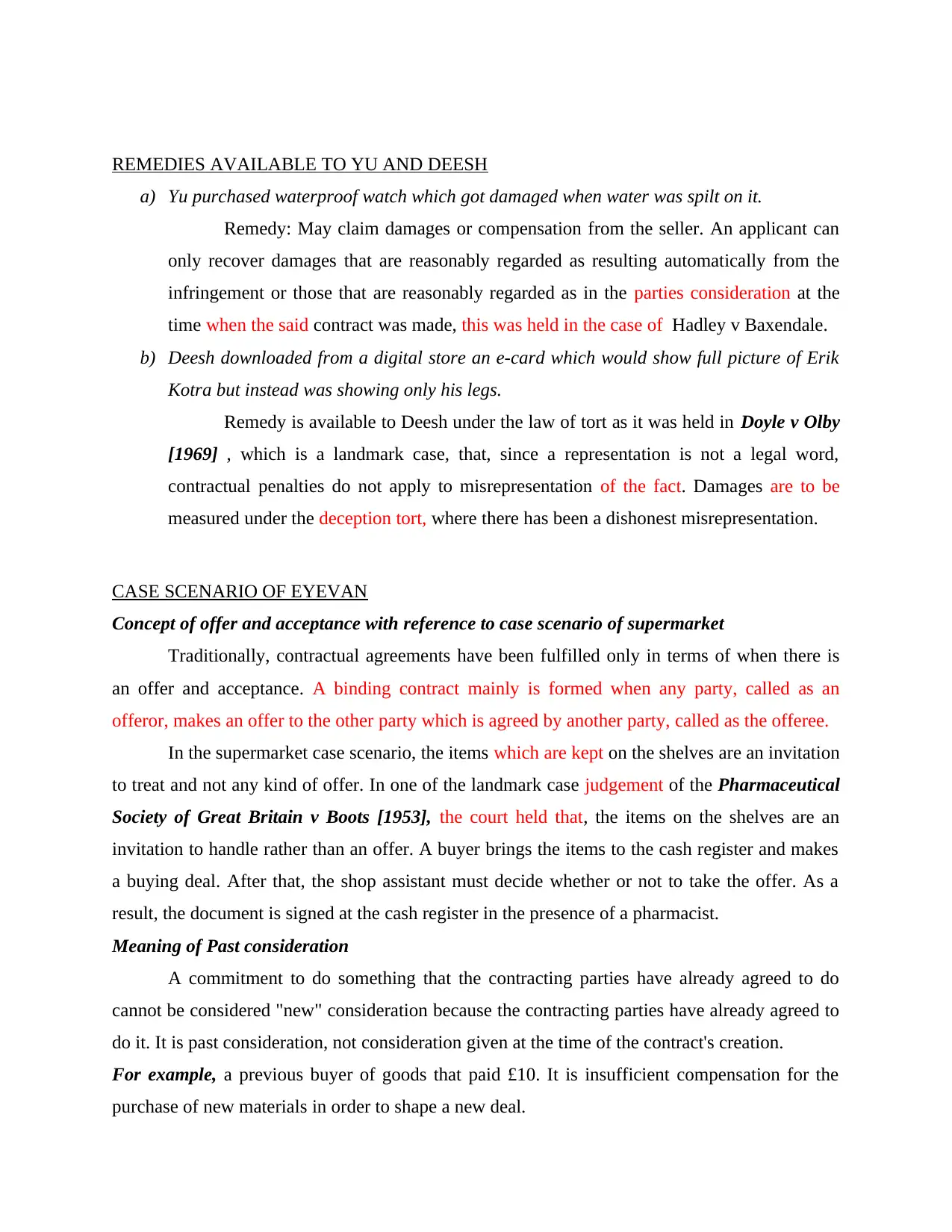
REMEDIES AVAILABLE TO YU AND DEESH
a) Yu purchased waterproof watch which got damaged when water was spilt on it.
Remedy: May claim damages or compensation from the seller. An applicant can
only recover damages that are reasonably regarded as resulting automatically from the
infringement or those that are reasonably regarded as in the parties consideration at the
time when the said contract was made, this was held in the case of Hadley v Baxendale.
b) Deesh downloaded from a digital store an e-card which would show full picture of Erik
Kotra but instead was showing only his legs.
Remedy is available to Deesh under the law of tort as it was held in Doyle v Olby
[1969] , which is a landmark case, that, since a representation is not a legal word,
contractual penalties do not apply to misrepresentation of the fact. Damages are to be
measured under the deception tort, where there has been a dishonest misrepresentation.
CASE SCENARIO OF EYEVAN
Concept of offer and acceptance with reference to case scenario of supermarket
Traditionally, contractual agreements have been fulfilled only in terms of when there is
an offer and acceptance. A binding contract mainly is formed when any party, called as an
offeror, makes an offer to the other party which is agreed by another party, called as the offeree.
In the supermarket case scenario, the items which are kept on the shelves are an invitation
to treat and not any kind of offer. In one of the landmark case judgement of the Pharmaceutical
Society of Great Britain v Boots [1953], the court held that, the items on the shelves are an
invitation to handle rather than an offer. A buyer brings the items to the cash register and makes
a buying deal. After that, the shop assistant must decide whether or not to take the offer. As a
result, the document is signed at the cash register in the presence of a pharmacist.
Meaning of Past consideration
A commitment to do something that the contracting parties have already agreed to do
cannot be considered "new" consideration because the contracting parties have already agreed to
do it. It is past consideration, not consideration given at the time of the contract's creation.
For example, a previous buyer of goods that paid £10. It is insufficient compensation for the
purchase of new materials in order to shape a new deal.
a) Yu purchased waterproof watch which got damaged when water was spilt on it.
Remedy: May claim damages or compensation from the seller. An applicant can
only recover damages that are reasonably regarded as resulting automatically from the
infringement or those that are reasonably regarded as in the parties consideration at the
time when the said contract was made, this was held in the case of Hadley v Baxendale.
b) Deesh downloaded from a digital store an e-card which would show full picture of Erik
Kotra but instead was showing only his legs.
Remedy is available to Deesh under the law of tort as it was held in Doyle v Olby
[1969] , which is a landmark case, that, since a representation is not a legal word,
contractual penalties do not apply to misrepresentation of the fact. Damages are to be
measured under the deception tort, where there has been a dishonest misrepresentation.
CASE SCENARIO OF EYEVAN
Concept of offer and acceptance with reference to case scenario of supermarket
Traditionally, contractual agreements have been fulfilled only in terms of when there is
an offer and acceptance. A binding contract mainly is formed when any party, called as an
offeror, makes an offer to the other party which is agreed by another party, called as the offeree.
In the supermarket case scenario, the items which are kept on the shelves are an invitation
to treat and not any kind of offer. In one of the landmark case judgement of the Pharmaceutical
Society of Great Britain v Boots [1953], the court held that, the items on the shelves are an
invitation to handle rather than an offer. A buyer brings the items to the cash register and makes
a buying deal. After that, the shop assistant must decide whether or not to take the offer. As a
result, the document is signed at the cash register in the presence of a pharmacist.
Meaning of Past consideration
A commitment to do something that the contracting parties have already agreed to do
cannot be considered "new" consideration because the contracting parties have already agreed to
do it. It is past consideration, not consideration given at the time of the contract's creation.
For example, a previous buyer of goods that paid £10. It is insufficient compensation for the
purchase of new materials in order to shape a new deal.
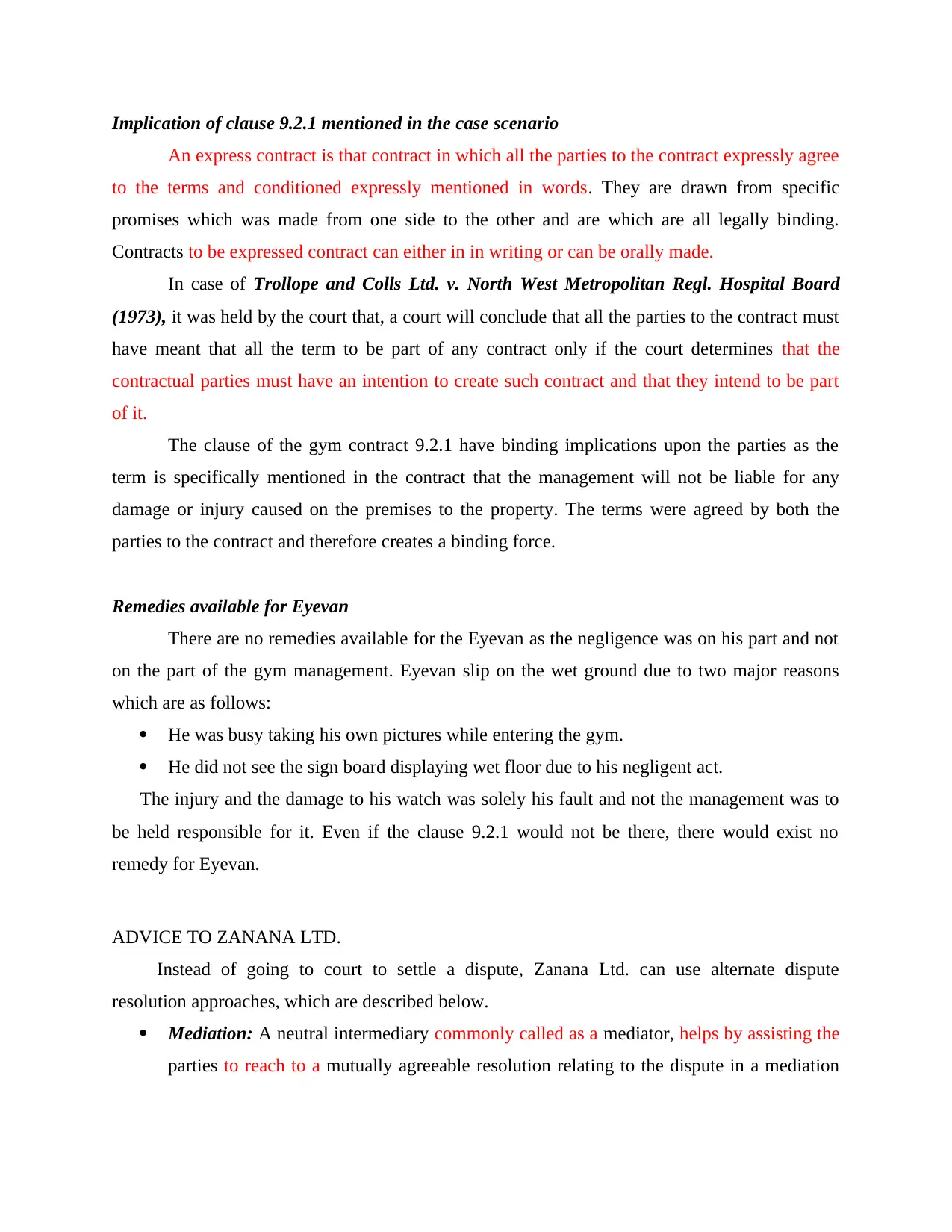
Implication of clause 9.2.1 mentioned in the case scenario
An express contract is that contract in which all the parties to the contract expressly agree
to the terms and conditioned expressly mentioned in words. They are drawn from specific
promises which was made from one side to the other and are which are all legally binding.
Contracts to be expressed contract can either in in writing or can be orally made.
In case of Trollope and Colls Ltd. v. North West Metropolitan Regl. Hospital Board
(1973), it was held by the court that, a court will conclude that all the parties to the contract must
have meant that all the term to be part of any contract only if the court determines that the
contractual parties must have an intention to create such contract and that they intend to be part
of it.
The clause of the gym contract 9.2.1 have binding implications upon the parties as the
term is specifically mentioned in the contract that the management will not be liable for any
damage or injury caused on the premises to the property. The terms were agreed by both the
parties to the contract and therefore creates a binding force.
Remedies available for Eyevan
There are no remedies available for the Eyevan as the negligence was on his part and not
on the part of the gym management. Eyevan slip on the wet ground due to two major reasons
which are as follows:
He was busy taking his own pictures while entering the gym.
He did not see the sign board displaying wet floor due to his negligent act.
The injury and the damage to his watch was solely his fault and not the management was to
be held responsible for it. Even if the clause 9.2.1 would not be there, there would exist no
remedy for Eyevan.
ADVICE TO ZANANA LTD.
Instead of going to court to settle a dispute, Zanana Ltd. can use alternate dispute
resolution approaches, which are described below.
Mediation: A neutral intermediary commonly called as a mediator, helps by assisting the
parties to reach to a mutually agreeable resolution relating to the dispute in a mediation
An express contract is that contract in which all the parties to the contract expressly agree
to the terms and conditioned expressly mentioned in words. They are drawn from specific
promises which was made from one side to the other and are which are all legally binding.
Contracts to be expressed contract can either in in writing or can be orally made.
In case of Trollope and Colls Ltd. v. North West Metropolitan Regl. Hospital Board
(1973), it was held by the court that, a court will conclude that all the parties to the contract must
have meant that all the term to be part of any contract only if the court determines that the
contractual parties must have an intention to create such contract and that they intend to be part
of it.
The clause of the gym contract 9.2.1 have binding implications upon the parties as the
term is specifically mentioned in the contract that the management will not be liable for any
damage or injury caused on the premises to the property. The terms were agreed by both the
parties to the contract and therefore creates a binding force.
Remedies available for Eyevan
There are no remedies available for the Eyevan as the negligence was on his part and not
on the part of the gym management. Eyevan slip on the wet ground due to two major reasons
which are as follows:
He was busy taking his own pictures while entering the gym.
He did not see the sign board displaying wet floor due to his negligent act.
The injury and the damage to his watch was solely his fault and not the management was to
be held responsible for it. Even if the clause 9.2.1 would not be there, there would exist no
remedy for Eyevan.
ADVICE TO ZANANA LTD.
Instead of going to court to settle a dispute, Zanana Ltd. can use alternate dispute
resolution approaches, which are described below.
Mediation: A neutral intermediary commonly called as a mediator, helps by assisting the
parties to reach to a mutually agreeable resolution relating to the dispute in a mediation
⊘ This is a preview!⊘
Do you want full access?
Subscribe today to unlock all pages.

Trusted by 1+ million students worldwide
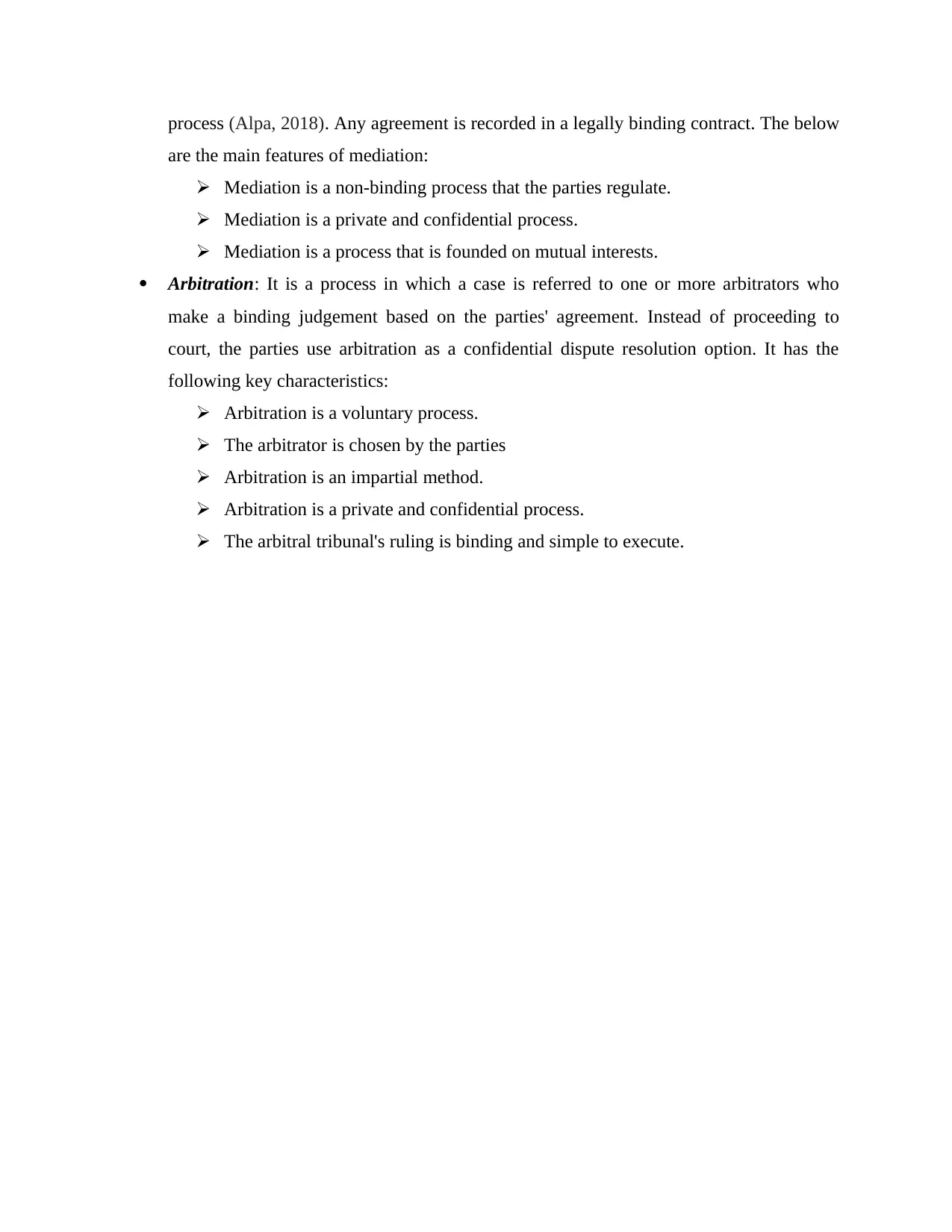
process (Alpa, 2018). Any agreement is recorded in a legally binding contract. The below
are the main features of mediation:
Mediation is a non-binding process that the parties regulate.
Mediation is a private and confidential process.
Mediation is a process that is founded on mutual interests.
Arbitration: It is a process in which a case is referred to one or more arbitrators who
make a binding judgement based on the parties' agreement. Instead of proceeding to
court, the parties use arbitration as a confidential dispute resolution option. It has the
following key characteristics:
Arbitration is a voluntary process.
The arbitrator is chosen by the parties
Arbitration is an impartial method.
Arbitration is a private and confidential process.
The arbitral tribunal's ruling is binding and simple to execute.
are the main features of mediation:
Mediation is a non-binding process that the parties regulate.
Mediation is a private and confidential process.
Mediation is a process that is founded on mutual interests.
Arbitration: It is a process in which a case is referred to one or more arbitrators who
make a binding judgement based on the parties' agreement. Instead of proceeding to
court, the parties use arbitration as a confidential dispute resolution option. It has the
following key characteristics:
Arbitration is a voluntary process.
The arbitrator is chosen by the parties
Arbitration is an impartial method.
Arbitration is a private and confidential process.
The arbitral tribunal's ruling is binding and simple to execute.
Paraphrase This Document
Need a fresh take? Get an instant paraphrase of this document with our AI Paraphraser
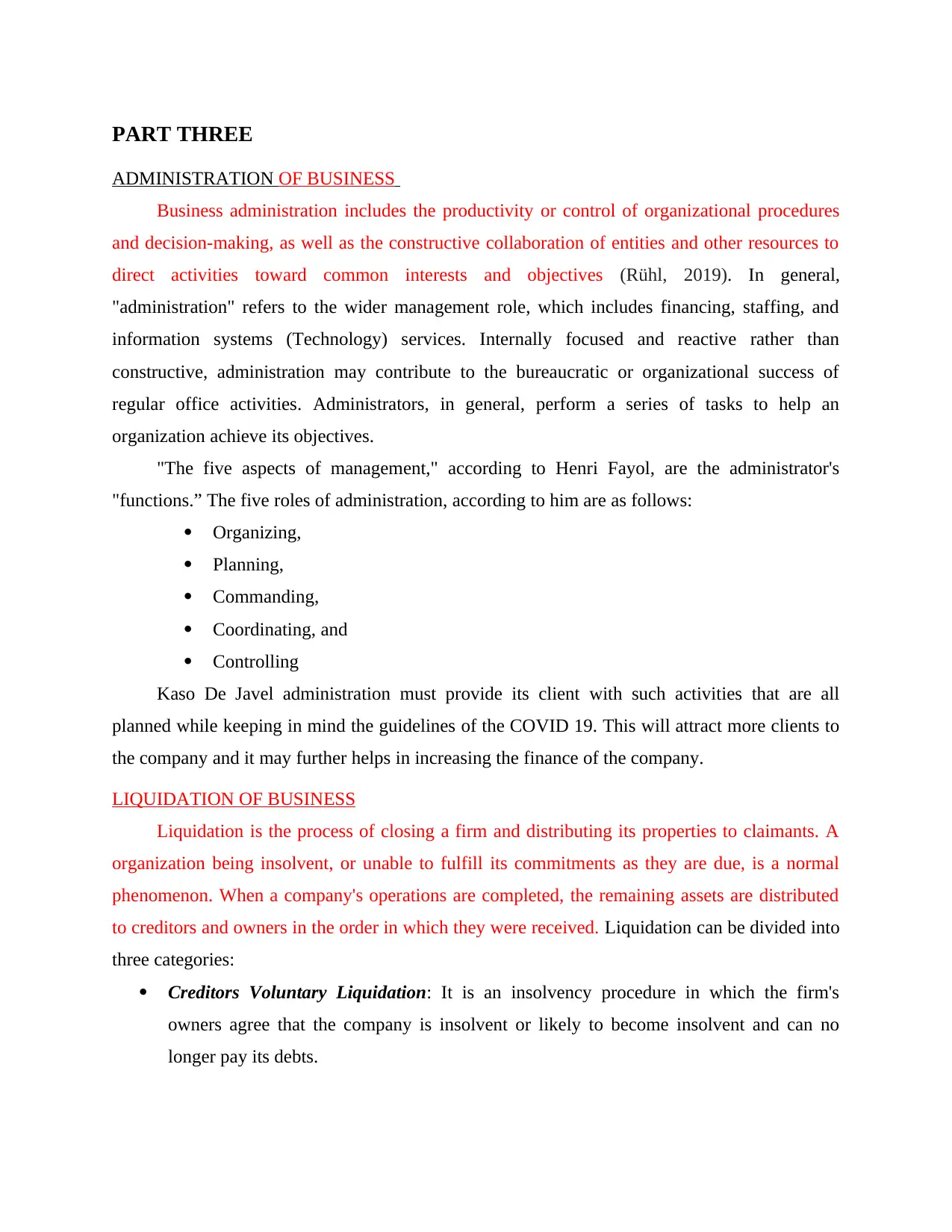
PART THREE
ADMINISTRATION OF BUSINESS
Business administration includes the productivity or control of organizational procedures
and decision-making, as well as the constructive collaboration of entities and other resources to
direct activities toward common interests and objectives (Rühl, 2019). In general,
"administration" refers to the wider management role, which includes financing, staffing, and
information systems (Technology) services. Internally focused and reactive rather than
constructive, administration may contribute to the bureaucratic or organizational success of
regular office activities. Administrators, in general, perform a series of tasks to help an
organization achieve its objectives.
"The five aspects of management," according to Henri Fayol, are the administrator's
"functions.” The five roles of administration, according to him are as follows:
Organizing,
Planning,
Commanding,
Coordinating, and
Controlling
Kaso De Javel administration must provide its client with such activities that are all
planned while keeping in mind the guidelines of the COVID 19. This will attract more clients to
the company and it may further helps in increasing the finance of the company.
LIQUIDATION OF BUSINESS
Liquidation is the process of closing a firm and distributing its properties to claimants. A
organization being insolvent, or unable to fulfill its commitments as they are due, is a normal
phenomenon. When a company's operations are completed, the remaining assets are distributed
to creditors and owners in the order in which they were received. Liquidation can be divided into
three categories:
Creditors Voluntary Liquidation: It is an insolvency procedure in which the firm's
owners agree that the company is insolvent or likely to become insolvent and can no
longer pay its debts.
ADMINISTRATION OF BUSINESS
Business administration includes the productivity or control of organizational procedures
and decision-making, as well as the constructive collaboration of entities and other resources to
direct activities toward common interests and objectives (Rühl, 2019). In general,
"administration" refers to the wider management role, which includes financing, staffing, and
information systems (Technology) services. Internally focused and reactive rather than
constructive, administration may contribute to the bureaucratic or organizational success of
regular office activities. Administrators, in general, perform a series of tasks to help an
organization achieve its objectives.
"The five aspects of management," according to Henri Fayol, are the administrator's
"functions.” The five roles of administration, according to him are as follows:
Organizing,
Planning,
Commanding,
Coordinating, and
Controlling
Kaso De Javel administration must provide its client with such activities that are all
planned while keeping in mind the guidelines of the COVID 19. This will attract more clients to
the company and it may further helps in increasing the finance of the company.
LIQUIDATION OF BUSINESS
Liquidation is the process of closing a firm and distributing its properties to claimants. A
organization being insolvent, or unable to fulfill its commitments as they are due, is a normal
phenomenon. When a company's operations are completed, the remaining assets are distributed
to creditors and owners in the order in which they were received. Liquidation can be divided into
three categories:
Creditors Voluntary Liquidation: It is an insolvency procedure in which the firm's
owners agree that the company is insolvent or likely to become insolvent and can no
longer pay its debts.
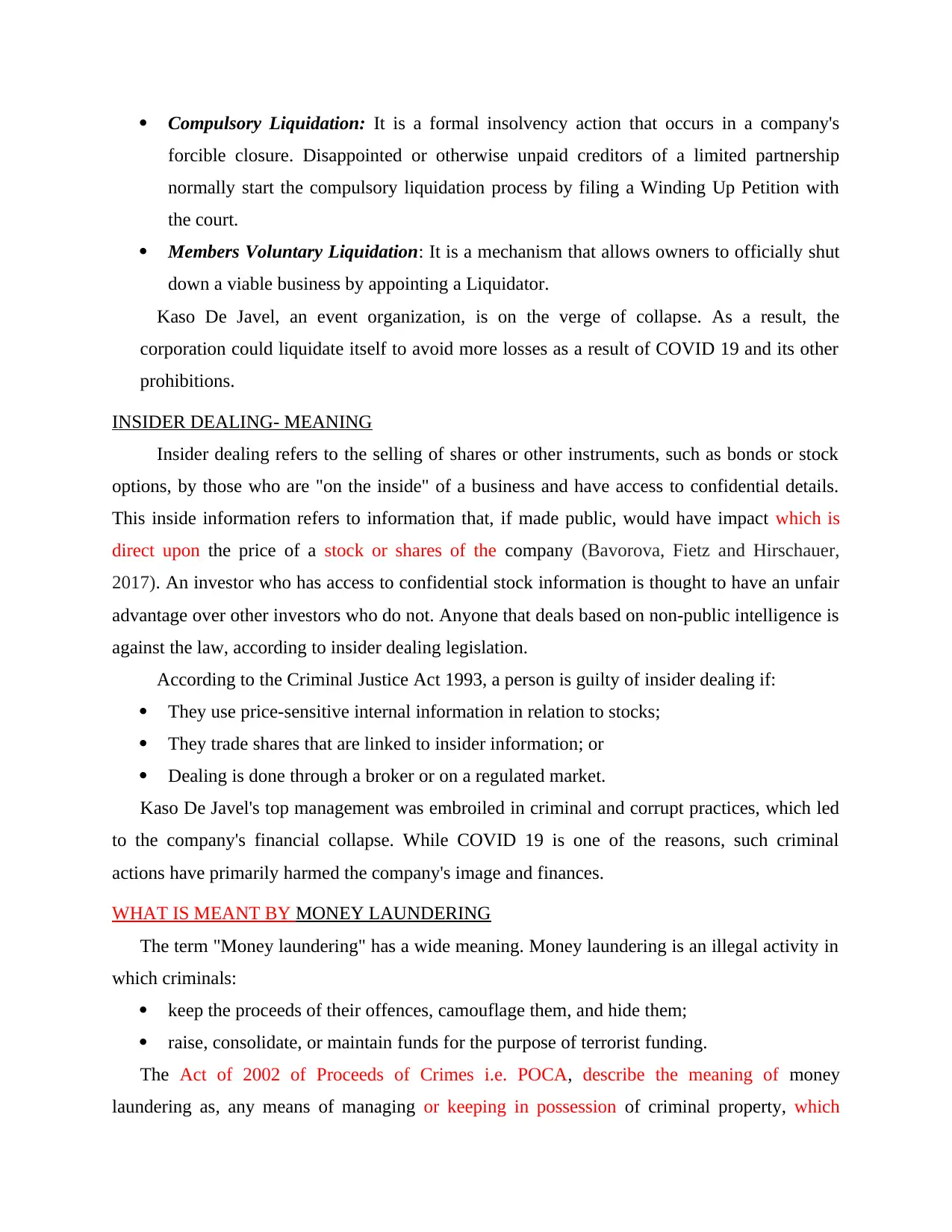
Compulsory Liquidation: It is a formal insolvency action that occurs in a company's
forcible closure. Disappointed or otherwise unpaid creditors of a limited partnership
normally start the compulsory liquidation process by filing a Winding Up Petition with
the court.
Members Voluntary Liquidation: It is a mechanism that allows owners to officially shut
down a viable business by appointing a Liquidator.
Kaso De Javel, an event organization, is on the verge of collapse. As a result, the
corporation could liquidate itself to avoid more losses as a result of COVID 19 and its other
prohibitions.
INSIDER DEALING- MEANING
Insider dealing refers to the selling of shares or other instruments, such as bonds or stock
options, by those who are "on the inside" of a business and have access to confidential details.
This inside information refers to information that, if made public, would have impact which is
direct upon the price of a stock or shares of the company (Bavorova, Fietz and Hirschauer,
2017). An investor who has access to confidential stock information is thought to have an unfair
advantage over other investors who do not. Anyone that deals based on non-public intelligence is
against the law, according to insider dealing legislation.
According to the Criminal Justice Act 1993, a person is guilty of insider dealing if:
They use price-sensitive internal information in relation to stocks;
They trade shares that are linked to insider information; or
Dealing is done through a broker or on a regulated market.
Kaso De Javel's top management was embroiled in criminal and corrupt practices, which led
to the company's financial collapse. While COVID 19 is one of the reasons, such criminal
actions have primarily harmed the company's image and finances.
WHAT IS MEANT BY MONEY LAUNDERING
The term "Money laundering" has a wide meaning. Money laundering is an illegal activity in
which criminals:
keep the proceeds of their offences, camouflage them, and hide them;
raise, consolidate, or maintain funds for the purpose of terrorist funding.
The Act of 2002 of Proceeds of Crimes i.e. POCA, describe the meaning of money
laundering as, any means of managing or keeping in possession of criminal property, which
forcible closure. Disappointed or otherwise unpaid creditors of a limited partnership
normally start the compulsory liquidation process by filing a Winding Up Petition with
the court.
Members Voluntary Liquidation: It is a mechanism that allows owners to officially shut
down a viable business by appointing a Liquidator.
Kaso De Javel, an event organization, is on the verge of collapse. As a result, the
corporation could liquidate itself to avoid more losses as a result of COVID 19 and its other
prohibitions.
INSIDER DEALING- MEANING
Insider dealing refers to the selling of shares or other instruments, such as bonds or stock
options, by those who are "on the inside" of a business and have access to confidential details.
This inside information refers to information that, if made public, would have impact which is
direct upon the price of a stock or shares of the company (Bavorova, Fietz and Hirschauer,
2017). An investor who has access to confidential stock information is thought to have an unfair
advantage over other investors who do not. Anyone that deals based on non-public intelligence is
against the law, according to insider dealing legislation.
According to the Criminal Justice Act 1993, a person is guilty of insider dealing if:
They use price-sensitive internal information in relation to stocks;
They trade shares that are linked to insider information; or
Dealing is done through a broker or on a regulated market.
Kaso De Javel's top management was embroiled in criminal and corrupt practices, which led
to the company's financial collapse. While COVID 19 is one of the reasons, such criminal
actions have primarily harmed the company's image and finances.
WHAT IS MEANT BY MONEY LAUNDERING
The term "Money laundering" has a wide meaning. Money laundering is an illegal activity in
which criminals:
keep the proceeds of their offences, camouflage them, and hide them;
raise, consolidate, or maintain funds for the purpose of terrorist funding.
The Act of 2002 of Proceeds of Crimes i.e. POCA, describe the meaning of money
laundering as, any means of managing or keeping in possession of criminal property, which
⊘ This is a preview!⊘
Do you want full access?
Subscribe today to unlock all pages.

Trusted by 1+ million students worldwide
1 out of 14
Related Documents
Your All-in-One AI-Powered Toolkit for Academic Success.
+13062052269
info@desklib.com
Available 24*7 on WhatsApp / Email
![[object Object]](/_next/static/media/star-bottom.7253800d.svg)
Unlock your academic potential
Copyright © 2020–2025 A2Z Services. All Rights Reserved. Developed and managed by ZUCOL.





